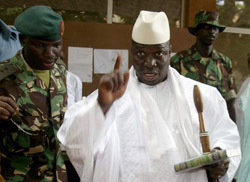Last week, President Yahya Jammeh, at left, discussed the unsolved 2004 murder case of editor Deyda Hydara in an interview on “One on One,” a weekly program on The Gambia Radio and Television Service. The government “has for long been accused by the international community and so-called human rights organisations for the murder of Deyda Hydara, but we have no stake in this issue,” media reports quoted Jammeh as saying. “And up to now one of these stupid Web sites carries ‘Who Killed Deyda Hydara’? Let them go and ask Deyda Hydara who killed him,” The Point newspaper quoted him as saying.
The president’s remarks on the shooting of the Gambia’s best-known journalist, as far as I am concerned, are rather disappointing. Friends, family, and colleagues of the outspoken editor of The Point have been awaiting justice since we were filled with sorrow that tragic night of December 16, 2004. One could not imagine that President Jammeh would tell people concerned about Hydara’s case to go and ask Deyda himself as to who killed him.
For me, this is the latest attempt by the president to disassociate the regime from the case. In 2006, in response to questions about the case, Jammeh declared to international media: “I don’t believe in killing people. I believe in locking you up for the rest of your life.” The president also stated, “The whole world can go to hell. If I want to ban any newspaper, I will, with good reason.” This came just three months after the arrest of journalist “Chief” Ebrima Manneh, who has not been heard from since, and followed a raid on my now-banned former newspaper, The Independent.
In this interview, Jammeh implied that investigations into the killing of Hydara, right, were stalled and should be conducted in neighboring Senegal. “The eyewitnesses of the killing of journalist Deyda Hydara are currently in neighboring Senegal and that [sic] all attempts by the National Intelligence Agency to talk to them in order to complete their investigations have proven futile,” Agence France-Presse quoted him as saying.
Yes, at least one of the eyewitnesses, former Point staffer Ida Jagne-Joof, is living in Senegal, but the killing took place here in the Gambia. The bullets that killed Hydara should be either with the police or the hospital authorities. All the evidence, including the results of a postmortem examination, is with the authorities. It is therefore difficult to understand how, to this day, authorities have yet to hand a postmortem report to the editor’s family. Furthermore, authorities have never interviewed the other witness wounded in the fatal shooting, Nyang Sara Jobe. She remains a newsroom typist at The Point in Banjul.
What the government of the Gambia should do is mount a serious investigation into the killing of this man. A 2005 investigative report issued by the National Intelligence Agency did not address the question of who killed Hydara, but rather speculated on possible motives to the murder and accused the journalist of being a womanizer.
I would therefore encourage the government to invite international investigators to look into the case. Recently, the government invited the U.N. and ECOWAS (the Economic Community of West African States) to investigate the killings of Ghanaians killed on Gambian soil in 2005. That is an effort that is commendable. In the same vein, I think they should do the same for Hydara.
Madi Ceesay, a veteran journalist based in Banjul, the Gambia, is the editor and publisher of the Daily News newspaper. He was a 2006 recipient of CPJ’s International Press Freedom Award.
